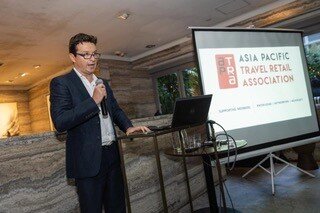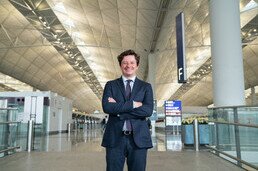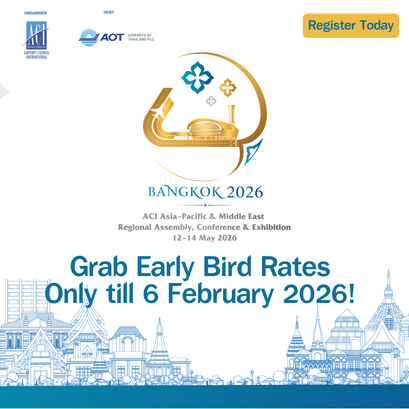Navigating today’s challenges and looking ahead
- 03 Sep 2021
The speech below was delivered on 3 September 2021 at the APTRA Exchange in Hong Kong by Stefano Baronci, Director General, ACI Asia-Pacific.

ACI Asia-Pacific's Director General speaking at APTRA Exchange
I am not here to prescribe a medicine or pill against anxiety. But it is fair to say that in the 20 months since the start of the pandemic, we are still very much in a wait-and-see mode in many Asian countries. Despite this, if I had to ask how the working life of people has changed since the start of the pandemic, I suspect that many of us would be of the opinion that we are not working less and that we are certainly doing it differently.
What in my opinion is truly difficult to accept is that the approach of solving problems - something we are taught to do from a young age – does not seem to be conducive to overcoming the current challenge.
The supply side our region is heavily constrained by travel restrictions. About 80% of passenger traffic was lost in August 2021 compared to 2019 levels in several airports of our region. Globally, in 2020 we were back to 1999 passenger traffic level. This reminds me how passenger traffic was consistently strong over the last twenty years, with few temporary fluctuations. And also, how much we were inebriated by a growth that we almost took for granted.
It mentally hurts to read the pre-COVID forecast related to airport revenue growth. In 2020, airports were lagging 60% behind their pre-Covid forecast levels. A result that is likely to be replicated in 2021 in many Asian markets.
We follow the science and the science is based on evidence. But by nature, we also work to build consensus. And consensus is based on compromise.
“Valuing compromise for the common good” means finding a balance between the health and the wealth of the people. Funnily enough, as much as these two English words are similar – just one letter difference – they are also very much interconnected.
A common quote says: “the greatest wealth is health”. Health authorities remind us that the cost of an outbreak will be much higher than the cost of shutting borders or long quarantine. Nobody can deny this. The existential threat of COVID is primarily perceived as saving people’s lives from a still partially unknown virus. And rightly so.
In many of the societies where we operate, inequalities are being exposed. Many have had challenges accessing the vaccine. Many are faced with a too fragile public health care system to bear this unprecedented challenge. Some cultural factors may have a role to play.

Industry representatives at first in-person event in 18 months
What do we know is that the vaccines continues to be a scarce resource. By the end of August, only 27% of the world population has been fully vaccinated which accounts for about 2.12 billion people. China and India account for almost 50% of this group. However, in relative terms, they have reached 61% and 10% respectively of double-dosing their populations. Therefore, it is still a long way to go. The speed of vaccination is now faster in some parts of Asia than in other regions. However, most of the countries are still below 50% of people fully vaccinated, with some fast runners such as Cambodia, Japan and Malaysia against some highly-populated countries that are still lagging behind, such as India, Indonesia, Philippines, Thailand and Vietnam accounting for less than 15% of their people fully vaccinated. Just a few days ago, Malaysia announced it’s not ready to open tourist destination Langkawi Island, even though the local population has reached herd immunity.
The depression in traffic of the region is mainly linked to international traffic. Domestic traffic has proven that opportunities are there if the pandemic can be kept under control and some countries have moved in that direction. Just look at China.
Global players have a competitive advantage. The ones that have diversified their portfolio from a product/service and geographical perspective will be in a better position to navigate through the crisis, by seizing opportunities whenever those materialise. This applies to airport operators, airlines, retailers, brands etc. Some are in the process of acquiring or consolidating their business bearing an objective risk but also preparing for a future stage of recovery to get a return on their investment in a much more solid position.
The risk borne by airport operators is a concept that will have to be reviewed. The airport business is a highly-regulated business, which subject the generation of aeronautical revenues to pre-defined criteria and scrutiny. This is one of the fundamentals that the crisis is significantly challenging in terms of its fairness and responsiveness. More than ever, airport hubs will be competing for connecting passengers and the race to be the most attractive destination for many tourist spots and their airports will be harsh, likely to serve a smaller pie of demand, especially in the recovery phase. Airport charges rules should be reviewed to ensure that beyond the strict and inflexible principle of cost-relatedness, market-based pricing or commercial agreements between airlines and airports are facilitated to share risks in a different way.
This can also apply to the airport commercial business. Declining spend per passenger in several markets, competition with online retail platforms and the now consolidated ride-sharing economy had already started to disrupt many of the traditional revenue streams before the crisis.
The Rent and Minimum Annual Guarantee traditional model is also subject to current scrutiny. Airports and their partners are studying new operating models at local and industry level with a deeper focus on profit sharing.
This without losing sight on the evolving passenger personas. There is a changing passenger profile: millennial passengers, as the largest-growing segment, represent new challenges and opportunities for the future of travel retail. Tailored offerings, strong relationships and a sense of place are all part of a customer-centric shopping experience. We want to avoid passenger getting to the airport distressed, potentially triggered by the additional bureaucracy for health identification. As demonstrated by ACI, satisfied customers are twice as likely to shop more than stressed ones.
To conclude, our businesses are likely to experience a significant structural change in the coming years. In my view, 2022, will be the decisive year to understand who will lead and who will follow.







